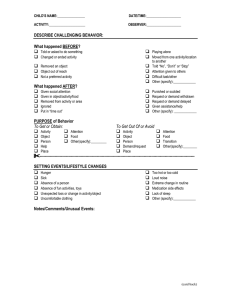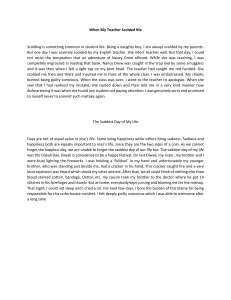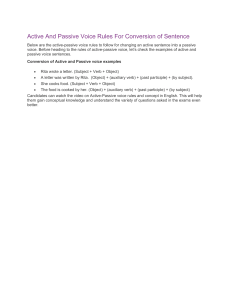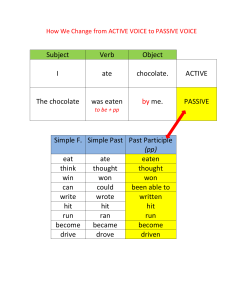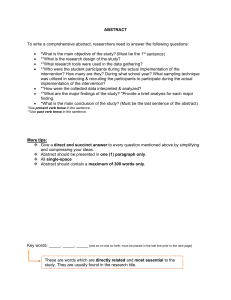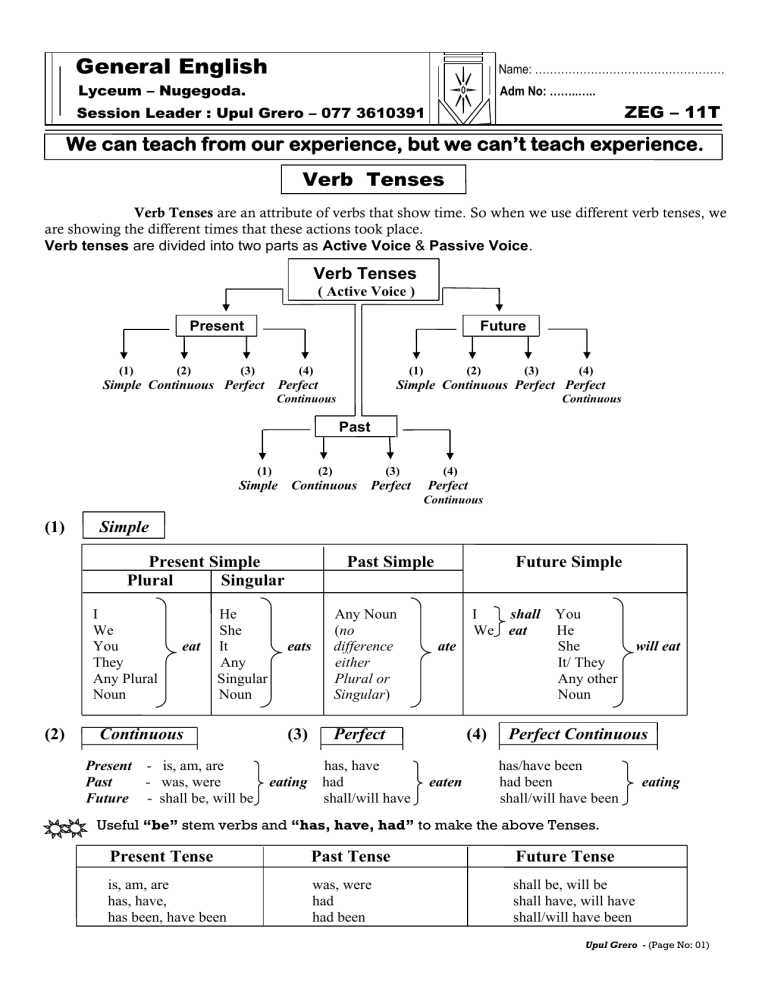
General English Name: …………………………………………… Lyceum – Nugegoda. Adm No: ……..….. ZEG – 11T Session Leader : Upul Grero – 077 3610391 We can teach from our experience, but we can’t teach experience. Verb Tenses Verb Tenses are an attribute of verbs that show time. So when we use different verb tenses, we are showing the different times that these actions took place. Verb tenses are divided into two parts as Active Voice & Passive Voice. Verb Tenses ( Active Voice ) Present (1) (2) Future (3) (4) Simple Continuous Perfect (1) Perfect (2) (3) (4) Simple Continuous Perfect Perfect Continuous Continuous Past (1) (2) (3) Simple Continuous Perfect (4) Perfect Continuous (1) Simple Present Simple Plural Singular I We You They Any Plural Noun (2) eat He She It Any Singular Noun Continuous Present - is, am, are Past - was, were Future - shall be, will be Past Simple eats (3) eating Any Noun (no difference either Plural or Singular) Future Simple I shall We eat ate Perfect has, have had shall/will have (4) eaten You He She It/ They Any other Noun will eat Perfect Continuous has/have been had been shall/will have been eating Useful “be” stem verbs and “has, have, had” to make the above Tenses. Present Tense Past Tense Future Tense is, am, are has, have, has been, have been was, were had had been shall be, will be shall have, will have shall/will have been Upul Grero - (Page No: 01) Upul Grero - (Page No:02) I eat. I am eating. I have eaten. I have been eating I ate. I was eating. I had eaten. I had been eating I shall eat. I shall be eating. I shall have eaten. I shall have been eating. Present Simple Present Continuous Present Perfect Present Perfect Continuous Past Simple Past Continuous Past Perfect Past perfect Continuous Future Simple Future Continuous The verb must agree with its subject in Number and Person. Future Perfect Continuous Future Perfect TABLE Plural OF He will eat. He will be eating. You will eat. You will be eating. You will have eaten. You will have been eating. We shall eat. We shall be eating. We shall have eaten. We shall have been eating. He – She - It or any other Singular Noun He will have eaten. He will have been eating. He ate. He was eating. He had eaten. He had been eating. He eats. He is eating. He has eaten. He has been eating. Singular Plural They will eat. They will be eating. They will have eaten. They will have been eating. They ate. They were eating. They had eaten. They had been eating. They eat. They are eating. They have eaten. They have been eating. 03rd Person TENSES You ate. You were eating. You had eaten. You had been eating. You eat. You are eating. You have eaten. You have been eating. Singular / Plural 02nd Person ACTIVE We ate. We were eating. We had eaten. We had been eating. We eat. We are eating. We have eaten. We have been eating. 01st Person Singular VERBS Active and Passive Voice Refer the following two sentences and they express the same meaning. (1) Shama scolds Rama. (Active ) (2) Rama is scolded by Shama. ( Passive ) In the 1st sentence the verb ( scolds ) shows that the person denoted by the subject does something. The object receives the action of the verb. In the 2nd sentence the verb (is scolded) shows that something is done to the person denoted by the subject. The subject receives the action of the verb. When the subject of the sentence is the agent or doer of the action we say that the sentence is in the Active Voice. When the subject receives or suffers the action, it is in the Passive Voice. The main verb of the Passive Voice sentence is always in Past Participle. The object of the Active verb becomes the subject of the Passive verb. Passive Voice = Subject + auxiliary verb (be) + main verb in Past Participle. Passive voice is used when; e.g. (a) We want to emphasize the Passive subject. 1. President R. Premadasa was killed in a May day rally. (President R. Premadasa – Affected subject) e.g. (b) We don’t want to show the Active subject. 2. The stolen car was found. The teacher (Performing Subject) explained the lesson. (Affected Subject) The lesson (Affected Subject) was explained by the teacher. (Performing Subject) A Table Of Active Tenses And Their Passive Equivalents. Active Passive Present Simple (Plural) Present Simple(Singular) Past Simple Future Simple scold scolds scolded shall/will scold are scolded is scolded was/were scolded shall be/will be scolded Present Continuous Past Continuous Future Continuous is/am/are/ scolding was/were scolding shall be/will be scolding is/am/are being scolded was/were being scolded ------------- No ------------- Present Perfect Past Perfect Future Perfect has/have scolded had scolded shall/will have scolded has/have been scolded had been scolded shall/will have been scolded Present Perfect Continuous Past Perfect Continuous Future Perfect Continuous has/have been scolding ----------------No-------------had been scolding ----------------No-------------shall/will have been scolding ----------------No-------------Upul Grero - (Page No: 03) MAIN VERB TENSES IN ACTIVE AND PASSIVE VOICE Simple Present Tense Active 1st Person 2nd Person 3rd Person - Passive I scold You scold He scolds - I am scolded. You are scolded. He is scolded. Mainly used to convey habitual actions, general incidents, eternal truths …etc; They show actions that happen regularly or that are permanently happening. It can be used with adverbs such as; normally, usually, often, frequently, always, sometimes, occasionally, seldom, rarely, scarcely, now and then, daily, weekly, monthly, on Sundays, once a week, every other day, once in a fortnight, ever, never…..etc, e.g. 1. We normally go to Kandy by bus. 2. She usually writes very clearly. - “is, am or are” are used as helping verbs. For Passive Voice Notes : …………………………………………………………………………………………………………… ……………………………………………………………………………………………………………………... …………………………………………………………………………………………………………………….. ……………………………………………………………………………………………………………………… Simple Past Tense Active 1st Person 2nd Person 3rd Person - I scolded You scolded He scolded Passive - I was scolded. You were scolded. He was scolded. Used to convey habitual actions in the Past and for actions already completed at a definite time. It can be used with ; last night, last Sunday, two days ago, a fortnight ago, before previously, recently…..etc, e.g. 1. We went to Kandy last night. 2. She wrote very clearly last Sunday. For Passive Voice - “was or were” as helping verbs. Notes : ……………………………………………………………………………………………………………. ……………………………………………………………………………………………………………………… ……………………………………………………………………………………………………………………… ……………………………………………………………………………………………………………………… Simple Future Tense Active 1st Person 2nd Person 3rd Person - I shall scold You will scold He will scold Passive - I shall be scolded. You will be scolded. He will be scolded. Used to convey future habitual actions and the actions still to take place. Add either will or shall to the main verb (infinitive). Upul Grero - (Page No: 04) It can be used with; tomorrow, next week, next month, in two days time, again…etc, e.g. 1. We shall go to Kandy tomorrow. 2. She will write very clearly next week. For Passive Voice Future Action – “shall be or will be” as helping verbs. “ going to ” + We use “going to” when we have already decided to do something. Don’t come. I am going to clean the house next week. (not I will clean) + We use “will or shall” when we decide to do something at the time of speaking. The speaker has not decided before. We will get our results next week. e.g. e.g. - Notes : ……………………………………………………………………………………………………………. ……………………………………………………………………………………………………………………… ……………………………………………………………………………………………………………………… ……………………………………………………………………………………………………………………… Present Continuous Tense Active 1st Person 2nd Person 3rd Person - I am scolding. You are scolding. He is scolding. Passive - I am being scolded. You are being scolded. He is being scolded. It represents an action as going on at the time of speaking and an action to take place near future. e.g. 1. We are going to Kandy . 2. She is writing very clearly. Action happening now. 3. I am taking my exam next month. 4. We are going to eat in a restaurant tonight. Action happening in the future. ( In these two (3) & (4) sentences we have a firm plan or a programme before speaking ). Active Voice Passive Voice - “is, am or are” + Main verb in Present Participle. “is, am or are” + being + main verb in Past Participle. Notes : ……………………………………………………………………………………………………………. ……………………………………………………………………………………………………………………… ……………………………………………………………………………………………………………………… ……………………………………………………………………………………………………………………… Past Continuous Tense Active 1st Person 2nd Person 3rd Person - I was scolding. You were scolding. He was scolding. Passive - I was being scolded. You were being scolded. He was being scolded. It represents an action as going on at some point in the past. e.g. 1. We were going to Kandy. 2. She was writing very clearly. Upul Grero - (Page No: 05) Active Voice Passive Voice “was or were” + main verb in Present Participle. “was or were” + being + main verb in Past Participle. - Notes : ……………………………………………………………………………………………………………. ……………………………………………………………………………………………………………………… ……………………………………………………………………………………………………………………… ……………………………………………………………………………………………………………………… Future Continuous Tense 1st Person 2nd Person 3rd Person - Active Passive I shall be scolding. You will be scolding. He will be scolding. - ------------No----------------------No----------------------No----------- It represents an action as going on at some point in future. e.g. 1. We shall be going to Kandy. 2. She will be writing very clearly. Active Voice Passive Voice - “shall be or will be” + main verb in Present Participle. Cannot be formed. Continuous tenses are only for Actions and Happenings. e.g. 1. He is speaking. (Action ) 2. It is raining. ( Happening ) It’s incorrect to say ( correct way ) I am wanting to sleep now. I want to sleep now. She is knowing me very well. She knows me very well. ( incorrect ) ( correct ) want, know, need, seem, like, understand, belong, remember, prefer…..etc, are not used in Continuous Tenses as they are not Action Verbs. Notes : ……………………………………………………………………………………………………………. ……………………………………………………………………………………………………………………… ……………………………………………………………………………………………………………………… ……………………………………………………………………………………………………………………… Present Perfect Tense Active 1st Person 2nd Person 3rd Person - I have scolded. You have scolded. He has scolded. Passive - I have been scolded. You have been scolded. He has been scolded. Used to indicate completed activities in the immediate past. Also used, instead of a Past tense, to represent a past action as continuing to the present. e.g. 1. We have gone to Kandy. 2. She has written very clearly. Upul Grero - (Page No: 06) Active Voice Passive Voice - “has or have” + main verb in Past Participle. “has or have” + been + main verb in Past Participle. Notes : ……………………………………………………………………………………………………………. ……………………………………………………………………………………………………………………… ……………………………………………………………………………………………………………………… ……………………………………………………………………………………………………………………… Past Perfect Tense Active 1st Person 2nd Person 3rd Person - I had scolded. You had scolded. He had scolded Passive - I had been scolded. You had been scolded. He had been scolded. Used to indicate an action completed at some point in Past tense before another action was commenced. e.g. 1. We had gone to Kandy. 2. She had written very clearly. Active Voice Passive Voice - “had” + main verb in Past Participle. “had” + been + main verb in Past Participle. Notes : ……………………………………………………………………………………………………………. ……………………………………………………………………………………………………………………… ……………………………………………………………………………………………………………………… ……………………………………………………………………………………………………………………… Future Perfect Tense 1st Person 2nd Person 3rd Person - Active Passive I shall have scolded. You will have scolded. He will have scolded. - I shall have been scolded. You will have been scolded. He will have been scolded. Used to indicate the completion of an action at some point in future time. e.g. 1. By tomorrow, we shall have gone to Kandy. 2. By evening, she will have written very clearly. Active Voice - “shall have or will have” + main verb in Past Participle. Passive Voice - “shall have or will have” + been + main verb in Past Participle. Notes : ……………………………………………………………………………………………………………. ……………………………………………………………………………………………………………………… ……………………………………………………………………………………………………………………… ……………………………………………………………………………………………………………………… Present Perfect Continuous Tense Active 1st Person 2nd Person 3rd Person - I have been scolding. You have been scolding. He has been scolding. Passive - ------------No----------------------No----------------------No----------Upul Grero - (Page No: 07) Used for an action that began at some time back in the past & is still continuing. e.g. 1. We have been going to Kandy. 2. She has been writing very clearly. - “have been or has been” + main verb in Present Participle. - Cannot be formed. Active Voice Passive Voice Notes : ……………………………………………………………………………………………………………. ……………………………………………………………………………………………………………………… ……………………………………………………………………………………………………………………… ……………………………………………………………………………………………………………………… Past Perfect Continuous Tense Active 1st Person 2nd Person 3rd Person - Passive I had been scolding. You had been scolding. He had been scolding. - ------------No----------------------No----------------------No----------- Used for an action that began before a certain point in the past and continued up to that point. e.g. 1. We had been going to Kandy. 2. She had been writing very clearly. Active Voice Passive Voice - “had been” + main verb in Present Participle. Cannot be formed. Notes : ……………………………………………………………………………………………………………. ……………………………………………………………………………………………………………………… ……………………………………………………………………………………………………………………… ……………………………………………………………………………………………………………………… Future Perfect Continuous Tense Active 1st Person 2nd Person 3rd Person - Passive I shall have been scolding. - ------------No----------You will have been scolding.- ------------No----------He will have been scolding. - ------------No----------- Used to indicate the completion of an action by a certain future time. e.g. 1. We shall have been going to Kandy. 2. She will have been writing very clearly. Active Voice - “shall have been or will have been” + main verb in Present Participle. Passive Voice - Cannot be formed. Notes : ……………………………………………………………………………………………………………. ……………………………………………………………………………………………………………………… ……………………………………………………………………………………………………………………… ……………………………………………………………………………………………………………………… For and Since For - to talk about a period of time. 5 minutes, 2 months, 10 year …etc, e.g. I have worked as a teacher for 10 years. Since - to talk about a point in past time. 8.00 o’ clock, 1995, I left school..etc, e.g. I have been here since 8.00 o’clock. Upul Grero - (Page No: 08)
